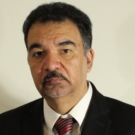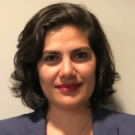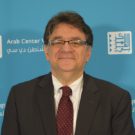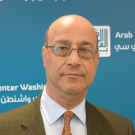Speakers

Abbas Kadhim
Director of Iraq Initiative & Resident Senior Fellow of Middle East Programs
Atlantic Council

Negar Mortazavi
Iranian-American journalist and media analyst for BBC, Al Jazeera, and CGTN
Moderator
Event summary
On January 16, 2020, Arab Center Washington DC (ACW) convened a panel at the National Press Club titled “Deconstructing the Soleimani Killing: Implications for the Region and Beyond.” Tamara Kharroub, ACW Assistant Executive Director and Senior Fellow, welcomed the speakers and audience and said the event’s goal was to address the US killing of Iran’s Major General Qassem Soleimani on January 3, 2020 and focus on the implications on the domestic level in Iran, regionally, and internationally. She asked the panelists to consider the question, are Iran and the United States ready to go to war, to negotiate, or neither?
The speakers were Daniel Brumberg, Associate Professor of Government at Georgetown University and Non-resident Senior Fellow at ACW; Negar Mortazavi, an Iranian-American journalist and media analyst for BBC, Al Jazeera, and CGTN; and Abbas Kadhim, Director of the Iraq Initiative and Resident Senior Fellow of Middle East Programs at the Atlantic Council. Imad Harb, ACW’s Director of Research and Analysis, moderated the panel and also addressed the implications for Lebanon and Syria.
Daniel Brumberg said that the Trump Administration’s approach to Iran is tactical and not undergirded by a clear strategy, and the implicit goals are regime change and economic warfare—which actually strengthen the hardliners in Iran. He explained that there are two choices for Iran and the United States: to resolve differences through negotiations and compromise or to make war. In pulling out of the Joint Comprehensive Plan of Action (JCPOA), the United States is now basically at war with Iran—“we have chosen that option,” he maintained. As for Iran, it has been desperate to sustain the nuclear agreement in order to sell its oil; its controlled escalation against the United States and working with the Europeans have not been a kind of expansionism, Brumberg noted, but reactions to US policy. Iran wants to avoid a military conflict with the United States because of the tremendous imbalance of power. The Trump Administration, on the other hand, can engage in maximum pressure on Iran, but the United States does not have the power to decisively prevail. Besides, Iran has all kinds of power to push back. Iran’s Islamic Revolutionary Guard Corps (IRGC) is adaptable and will continue to assert influence, despite the complex and contradictory protests in Baghdad, Beirut, and Tehran.
Negar Mortazavi described Soleimani as a capable commander of the IRGC’s Quds Force and an indispensable asset to the establishment in Iran. However, she said, the Quds Force is not a one-person operation and Soleimani was not irreplaceable, so the IRGC will not be compromised and the proxy fight will continue in the region in order to increase the costs of the US presence there. Despite the initial and muted Iranian response of bombing the Iraqi air base that housed American troops, Mortazavi said that “this is definitely not finished”: Iran will play the long game in the region. She agreed that the Trump Administration’s uncompromising policy on Iran has weakened the more moderate, pro-West, reformist forces and strengthened the hardliners. Soleimani’s funeral rallied millions of people, even though many liked or hated him, because they perceived his killing as an illegal assassination by the United States. She said that the killing actually helped to unite Iraq and Iran against the United States. Last November’s protests are likely to resume, but there will likely be a harsher response to them from the regime. Mortazavi predicted that if a Democrat is elected this year as president, Iran will work toward reinstituting the JCPOA.
Abbas Kadhim said that after the Soleimani killing, “Iraq found itself in the middle of a fight between its two most important allies, the US and Iran.” Its leaders are finding it hard to handle the situation, especially since they are also witnessing public protests against their performance. To be sure, he said, the recent events have been a deal breaker for Iraq’s consensus government. Kadhim said that US interests in Iraq are represented by diplomatic, military, and business presence. In reality, however, there no longer is a military agreement between Washington and Baghdad after the official withdrawal of US troops in December 2011. US troops in Iraq are there to combat the Islamic State (IS); but with IS being defeated in 2017, Iran and its allies are pressuring the Iraqi government not to let US troops stay. The Baghdad government, on the other hand, has argued that US troops provide security, infrastructure, and training for Iraqis. At the same time, Iraq is dependent on Iran for fuel and electricity and the two have historical and mutual interests. Kadhim said that the Soleimani assassination showed the American diplomatic deficit but acknowledged that Iraq owes a great deal to the United States and needs robust relations with Washington which has significant responsibilities in Iraq. He said that “I think diplomatic relations are not necessarily lost.” Kadhim asserted that Iraq should not serve as a convenient theater of war between its allies. He finally asserted that while the United States can leave Iraq anytime it wants to, Iran cannot give up on its relations with that country.
Imad Harb agreed that killing Soleimani did not scuttle Iran’s regional policies and its influence in different Arab countries. In Lebanon, the secretary general of the Iran-backed Hezbollah lambasted the killing of his friend Soleimani; but Harb asked, will Hezbollah be able to respond and avenge this act? He said that Hezbollah operates in—and is constrained by—the context of Lebanese domestic issues. It is an overwhelming force in Lebanon and “practically runs the country,” he noted. However, it has lost some of its legitimacy in the country because it now stands against the poor and marginalized it has always claimed to represent. Although it is instrumental in forming the country’s new government, it will not be able to force it to do all it wants. Neither can Hezbollah start a war with Israel because it will be devastating for Lebanon. In Syria, Iran’s interests are governed by Russia’s desires; indeed, Soleimani’s assassination has given Russia a way to increase its influence in Syria at the expense of Iran. Harb said that Iran today lacks the influence it had in Syria when Soleimani was alive, and it is restricted in what it can do in Syria not only by Russia but by Israel as well.
Event Photos


